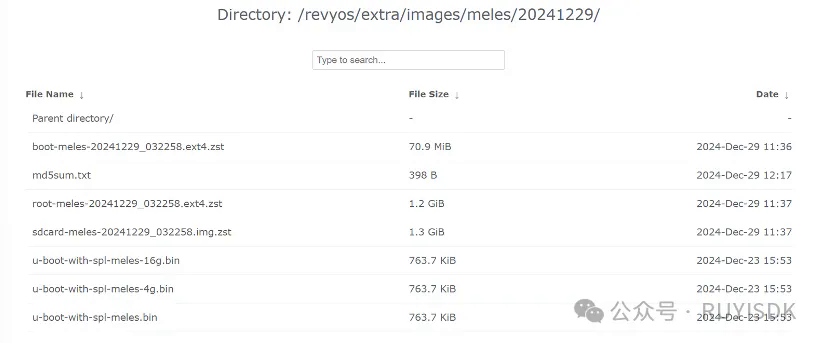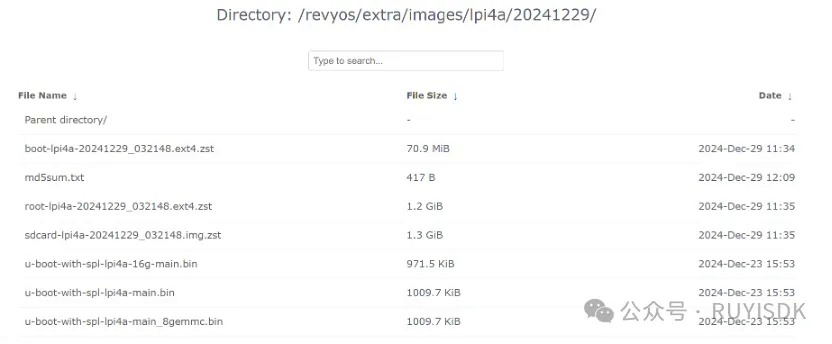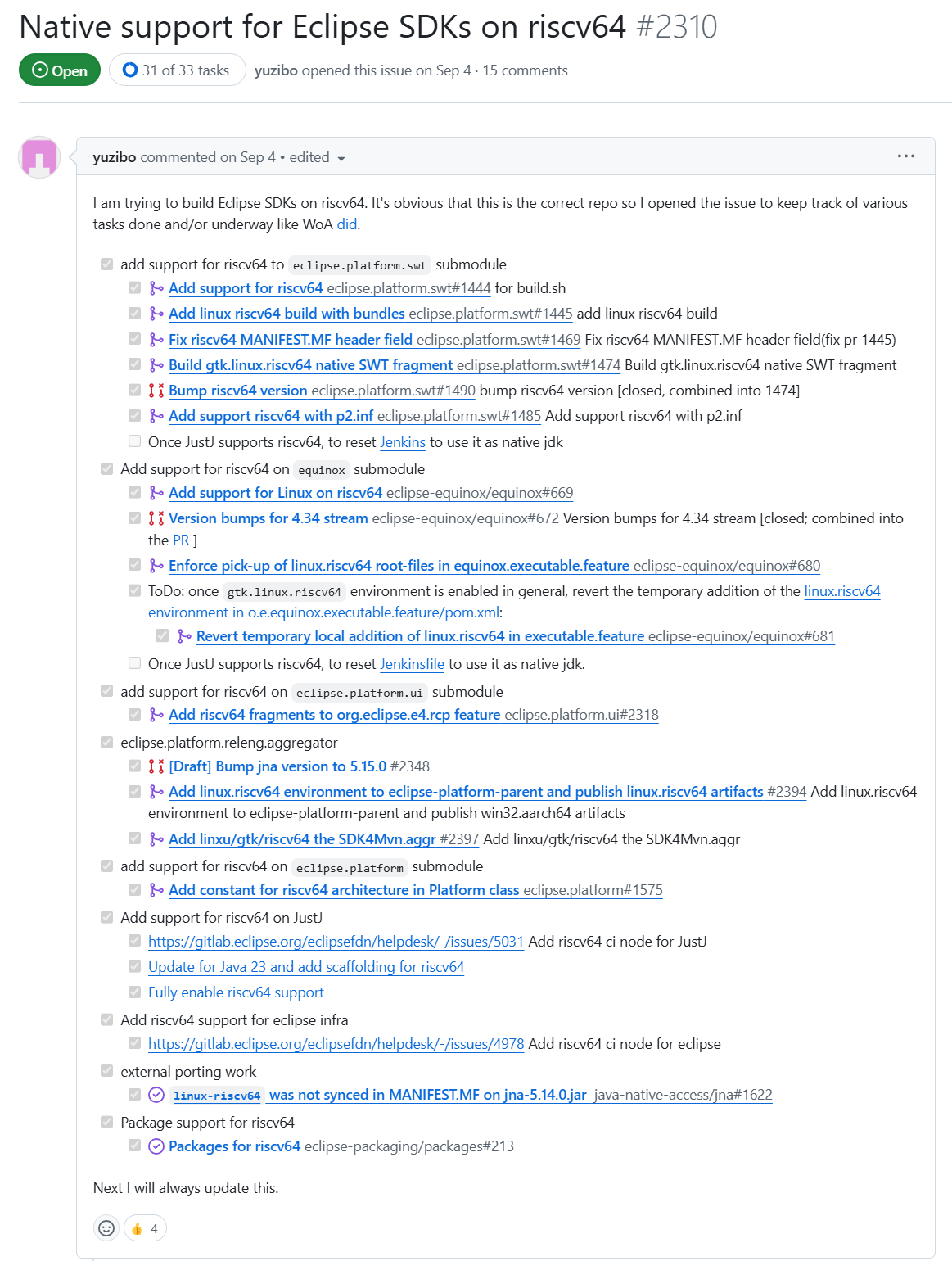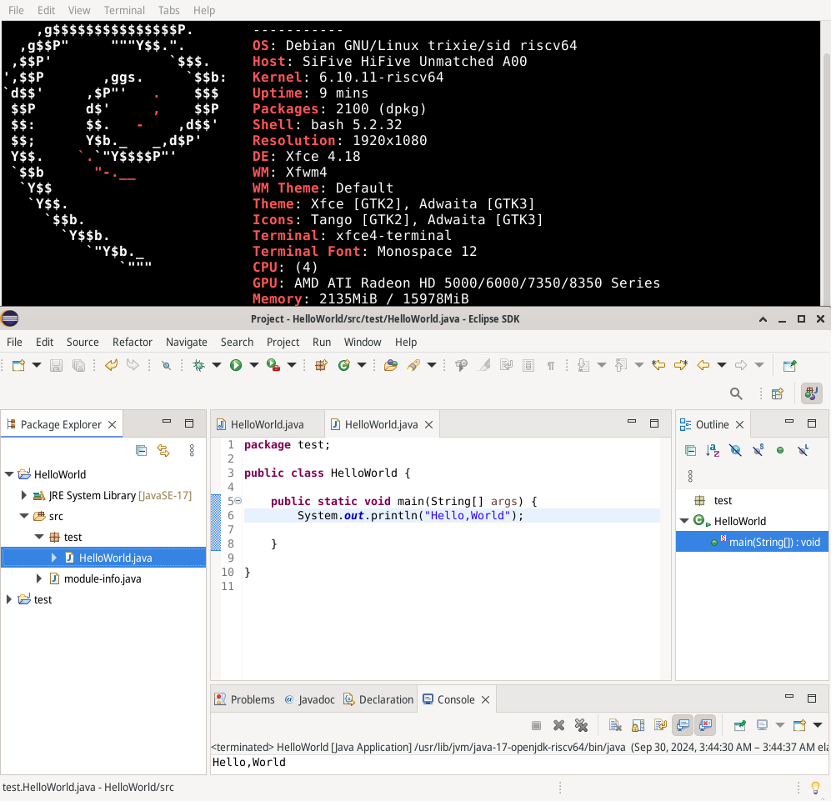Blog
See important news from the RuyiSDK team at any time
12月29日,面向 TH1520 的 RevyOS 操作系统已完成内核版本从 5.1 至 6.6 的更新,并提供了对 Milk-V Meles 和 LicheePi 4A 的最新支持,新增支持如下:
- CPU 调频和风扇调速功能
- 支持 Milk-V Meles 和 LicheePi 4A 8GB 内存版本
- 在 eMMC 存储上运行正常,可以通过 eMMC 启动操作系统
- 有线网络连接功能,确保用户在使用时可以通过以太网稳定地连接互联网
- HDMI 显示输出/音频
- 支持 AP6256 WiFi 模块(需要更新内核后使用)
截至目前,RevyOS 已全面覆盖 Milk-V Meles 4GB/8GB/16GB 和 LicheePi 4A 8GB/16GB 的多版本支持。

Milk-V Meles 最新 RevyOS 版本镜像下��载地址(镜像支持SD卡刷写):
https://mirror.iscas.ac.cn/revyos/extra/images/meles/20241229/

LicheePi 4A 最新 RevyOS 版本镜像下载地址(镜像支持SD卡刷写):
https://mirror.iscas.ac.cn/revyos/extra/images/lpi4a/20241229/
为了帮助开发者更好地理解和使用 RevyOS,团队还提供了丰富的教程文档,涵盖了 Debian 软件包构建、GCC 编译工具链、 XuanTie QEMU 编译流程以及内核替换与编译等,请访问官方文档库获取更多资源:

https://docs.revyos.dev/
基于玄铁 C910 内核,最高主频可达2.5GHz,支持全链路安全防护,具有4k视频处理能力,同时含有丰富的异构计算和高速IO资源。可广泛用于中高性能的应用场景,欢迎开发者扫码,备注【TH1520】进微信群。

RuyiSDK 0.24 is now released. The corresponding package manager version is also 0.24.0.
You can download the RuyiSDK package manager from one of the following locations:
This update mainly consists of the following changes. Happy hacking!
- Updated dependency versions.
- Updated the following software to the latest versions:
board-image/armbian-pine64-star64board-image/buildroot-sdk-milkv-duoboard-image/buildroot-sdk-milkv-duos-sdboard-image/buildroot-sdk-sipeed-licheervnanoboard-image/debian-fishwaldo-sg200x-sipeed-licheervnanoboard-image/revyos-sipeed-lpi4aboard-image/uboot-revyos-sipeed-lpi4a-16gboard-image/uboot-revyos-sipeed-lpi4a-8gextra/wps-office
RuyiSDK 0.23 is now released. The corresponding package manager version is also 0.23.0.
You can download the RuyiSDK package manager from one of the following locations:
This update mainly consists of the following changes. Happy hacking!
- Due to project acceptance requirements, the default telemetry mode has been changed to
on. Subsequently, anonymized usage statistics will be periodically uploaded with updates to the RuyiSDK software repository. The telemetry server is located in mainland China and is managed by the RuyiSDK team.
- Fixed compatibility with the external dependency
semver 2.x version.
- Allowed running
ruyi as root in CI environments.
- Each release now comes with reproducible source packages, which is helpful for distribution packaging work.
Note: Due to metrics such as the number of active users being project KPIs, RuyiSDK 0.23 has added the functionality to upload telemetry data, which is enabled by default in all environments, not just CI. You can decide whether to actively upload this anonymous statistical information to help the RuyiSDK team improve the product. You can also choose to delete previous telemetry data or disable telemetry. You can use ruyi self clean --telemetry to delete all telemetry information, including device information.
When telemetry mode is set to on, you will be notified when your telemetry data will be uploaded each time ruyi is called. You can do one of the following to suppress this prompt:
- Set the telemetry mode to
local or off;
- Consent to data upload behavior.
Here is an example of the ruyi configuration file. This configuration file is typically located at ~/.config/ruyi/config.toml. If it doesn't exist, you can create it:
# Include one of the following in the [telemetry] section. If this section doesn't exist, create it:
[telemetry]
# You can change the telemetry mode to local or off:
mode = "local"
# Or inform ruyi that you have given consent at the current date and time:
upload_consent = 2024-12-32T25:61:00+08:00
# This date format is not valid, this is intentional. Please fill in the current time of your operation. For example, execute the following command:
#
# echo "upload_consent = $(date -Iseconds)"
#
# The output can be used for the above purpose.
RuyiSDK 0.22 is now released. The corresponding package manager version is also 0.22.0.
You can download the RuyiSDK package manager from one of the following locations:
This update mainly consists of the following changes. Happy hacking!
- Added the RuyiSDK platform support documentation, and based on this, improved the platform compatibility of the RuyiSDK package manager:
- Lowered the minimum Python version requirement to 3.10 to maintain compatibility with the default Python version in Ubuntu 22.04 LTS.
- Reduced version requirements for various Python dependencies to work with packages provided by Ubuntu 22.04 LTS.
- Added the declaration of the
ruyi entry point according to Python packaging standards, allowing distribution packaging mechanisms to automatically recognize and process it.
Note: We will add the functionality to upload RuyiSDK telemetry data in RuyiSDK 0.23, and may enable it by default in CI environments. At that time, you can decide whether to actively upload this anonymous statistical information to help the RuyiSDK team improve the product. You can also choose to delete previous telemetry data and disable telemetry. You can use ruyi self clean --telemetry to delete all telemetry information, including device information.
RuyiSDK 0.21 is now released. The corresponding package manager version is also 0.21.0.
You can download the RuyiSDK package manager from one of the following locations:
This update mainly consists of the following changes. Happy hacking!
- Renamed the RuyiSDK software repository packaging helper command
ruyi admin manifest to ruyi admin checksum. If you are packaging for RuyiSDK, you may need to update your scripts.
- Added support for
ruyi self clean to delete news reading status (ruyi news): ruyi self clean --news-read-status.
- Added support for
ruyi self clean to delete all variable state files generated by ruyi at once: ruyi self clean --all.
- Fixed compatibility of
ruyi test cases with Python 3.11. We now ensure through CI that ruyi passes tests on Python 3.11, 3.12, and 3.13, which will help ensure compatibility across various Linux distributions.
- Added a missing declaration of the
typing_extensions dependency to fix third-party packaging.
- Refactored the way
ruyi subcommands are declared and implemented, making it more convenient to extend ruyi command-line functionality in the future.
Note: We may implement the RuyiSDK telemetry mechanism in the next one to two versions. At that time, you can decide whether to actively upload this anonymous statistical information to help the RuyiSDK team improve the product. You can also choose to delete previous telemetry data and disable telemetry. You can use ruyi self clean --telemetry to delete all telemetry information, including device information.
RuyiSDK 0.20 is now released. The corresponding package manager version is also 0.20.0.
You can download the RuyiSDK package manager from one of the following locations:
This update mainly consists of the following changes. Happy hacking!
- Fixed an issue where
ruyi self uninstall --purge would leave telemetry data behind.
- Fixed a bug where
ruyi admin subcommands could not be invoked.
- Fixed forwarding to commands without target tuple prefixes (such as a series of LLVM tools) in Ruyi virtual environments.
- Removed the Starlark sandbox from the plugin mechanism at the request of the RuyiSDK project. This helps simplify packaging and lower development barriers: according to RuyiSDK's current threat model, the sandbox mechanism does not provide additional security.
Note: Due to subtle semantic differences between Starlark and Python, after upgrading to ruyi 0.20.0, you must update your software repository to the latest with ruyi update in order to continue using certain features of ruyi (such as ruyi venv). Apart from this, we don't expect the technical changes to the plugin mechanism to affect actual usage.
Note: We may implement the RuyiSDK telemetry mechanism in the next one to two versions. At that time, you can decide whether to actively upload this anonymous statistical information to help the RuyiSDK team improve the product. You can also choose to delete previous telemetry data and disable telemetry. You can use ruyi self clean --telemetry to delete all telemetry information, including device information.
Eclipse 是一款开源且功能强大的集成开发环境(IDE),广泛支持多种编程语言,为开发者提供了一个统一的平台,用于编写、调试和管理代码。同时,Eclipse 还具备强大的插件系统,可根据需求灵活扩展功能。
近期,来自中国科学院软件研究所(ISCAS)的 RevyOS 小队的工程师联合其他开源社区开发者,成功为 Eclipse 上游代码仓库引入了对 riscv64 架构的初步支持。期间创建了二十余个 Issue/PR,涵盖了包括 SWT、Equinox 在内的关键组件。目前,Eclipse 已支持在 riscv64 平台上基于 OpenJDK 开发 Java 项目。

图1-Eclipse upstream 涉及到几十个不同的组建和支持过程,许多开发者都进行了贡献
相关改动已被合入上游,感兴趣的朋友可通过下方链接,建议选择 Integration Builds 板块中的最新构建日期(20240929以后每日构建支持riscv)进入每日构建资源页面,选择“Eclipse SDK -> Linux (64 bit version for RISC-V)”下载后进行体验。
https://download.eclipse.org/eclipse/downloads/index.html

图2-在安装了 Debian 操作系统的 SiFive Unmatched 上测试运行 Eclipse SDK IDE
��接下来,RevyOS 小队将继续完善 Eclipse riscv64 的支持,敬请期待更多优化与改进!
中国科学院软件研究所诚邀对开源技术充满热情的开源软件贡献者加入进来,助力 Eclipse 在 riscv64 平台上的发展。
关于 ISCAS、RevyOS小队
RevyOS小队隶属于 PLCT Lab, ISCAS。ISCAS 是 RISC-V International 的 Development Partner、Training Partner,同时在2024年8月获得了 RISC-V Ecosystem Labs 认证。
特别致谢以下贡献者
于波、陈璇、Hannes Wellmann、Alexander Kurtakov、Ed Merks、Pawel Stankiewicz、Frederic Gurr
如有遗漏,请联系作者
RuyiSDK 0.19 is now released. The corresponding package manager version is also 0.19.0.
You can download the RuyiSDK package manager from one of the following locations:
This update mainly consists of the following changes. Happy hacking!
- Fixed an issue where
ruyi news list would crash when the environment locale configuration was invalid on the local machine. This is also the first contribution to the RuyiSDK package manager from an external contributor. Thanks to RekiDunois!
- Added the
ruyi admin format-manifest command for package developers to automatically format software package description files to ensure they conform to standard formats.
- Added multi-toolchain support for
ruyi venv: It's now possible to configure multiple toolchain packages with different target tuples for a single virtual environment.
- Added the
ruyi self clean command to clean up various data generated by Ruyi, freeing up storage space.
- Provided means for distribution packagers to prevent users from accidentally running
ruyi self uninstall when distributions directly redistribute RuyiSDK's officially compiled ruyi binary.
- Implemented basic telemetry functionality, currently without data upload support. See the "Telemetry" section for details.
To help the RuyiSDK team better understand user habits and improve the experience, we have added basic telemetry functionality to the RuyiSDK package manager. There are 3 telemetry modes:
local: Only collects data, does not actively report. This is the default mode.on: Collects data and reports periodically. Not yet implemented.off: Completely disables telemetry.
Currently, we collect the following data:
- When running
ruyi for the first time, a small amount of device information is collected once:
- A unique installation ID generated only from the system random number generator, unrelated to any system configuration or local data;
- Whether the current running environment is one of several known CI services, such as GitHub Actions, GitLab CI, Travis CI, etc.;
- Operating system kernel type and processor architecture;
- C runtime library type and version (like
glibc 2.40);
- Linux distribution code name and version;
- If the processor architecture is RISC-V, RISC-V-specific information such as the system model specified by the device tree and the number of CPU cores, microarchitecture, ISA string, etc. exposed by
/proc/cpuinfo.
- Each time
ruyi is run, the type of command called is recorded, without parameters.
- Each time a toolchain proxy in the Ruyi virtual environment is run, the name of the command being called is recorded.
If you do not wish to participate in telemetry, you can do one of the following two operations before running the new version of ruyi. Either ensure that the environment variable RUYI_TELEMETRY_OPTOUT=1 exists (note: not OUTPUT), or add the following to the configuration file ~/.config/ruyi/config.toml:
Before RuyiSDK fully supports telemetry data upload, we will inform you, and you can decide whether to delete previous telemetry data and whether to disable telemetry. You can use ruyi self clean --telemetry to delete all telemetry information, including device information.
RuyiSDK packages are now available for several major Linux distributions:
- Debian 13 ("trixie")
- Fedora 39, 40, 41
- openEuler 24.03
- Ubuntu 22.04 ("jammy"), 24.04 ("noble")
- Arch Linux (via AUR)
We provide binaries for all three officially supported architectures: amd64, arm64, and riscv64, for all distributions except Fedora 39 and Fedora 41.
RuyiSDK 0.18 is now released. The corresponding package manager version is also 0.18.0.
You can download the RuyiSDK package manager from one of the following locations:
This update mainly consists of the following changes. Happy hacking!
- Further improved the fix for issue #181: While the previous fix addressed the missing characters in code blocks, it inadvertently caused Markdown list items and block quotes exceeding one line in length to be truncated.
- Addressed issue #193: Removed dependency on the third-party library
python-frontmatter to facilitate packaging work for distributions.
- Updated WPS Office to the latest upstream version.
- Updated the RV64ILP32 bare-metal toolchain
toolchain/gnu-plct-rv64ilp32-elf to the current latest version.
- Enhanced support for Milk-V Duo:
- Added the Milk-V Duo official example code repository
source/milkv-duo-examples. You can extract it in a new directory using the ruyi extract command.
- Added Milk-V official host toolchains for Milk-V Duo. Note: These are repackaged by RuyiSDK from the upstream repository under permission from the vendor, and upstream only provides binaries for the
x86_64 architecture:
toolchain/gnu-milkv-milkv-duo-bin: For Linux glibc environments.toolchain/gnu-milkv-milkv-duo-elf-bin: For bare-metal environments.toolchain/gnu-milkv-milkv-duo-musl-bin: For Linux musl environments.
- Updated the Milk-V Duo official system image packages to the latest upstream version. RuyiSDK has repackaged these images under permission from the vendor, so that all system images distributed through RuyiSDK channels can be logged in with the username and password
ruyisdk for your convenience.
RuyiSDK 0.17 is now released. The corresponding package manager version is also 0.17.0.
You can download the RuyiSDK package manager from one of the following locations:
This update mainly consists of the following changes. Happy hacking!
- Fixed issue #181: When using features like
ruyi news read in narrower terminal windows, long lines in Markdown code blocks no longer have missing characters, and there are no spaces at the beginning or end of lines that would affect copy-paste operations. The tradeoff is that the full-width beautiful background color is no longer implemented.
- Updated Box64 to the latest upstream development version.
- Updated WPS Office to the latest upstream version. Note: Upstream has removed native support for AArch64 architecture. These users will also need to rely on binary translation solutions to run WPS Office.
- Clarified the open source license for the software repository content: Apache 2.0 license, consistent with the Ruyi package manager itself.





